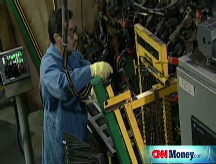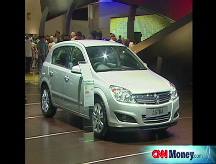Auto sales plunge again
Sharp fall in truck and SUV sales hurt GM and Ford, as well as Toyota and Honda, as consumers get squeezed by higher gas prices and weak economy.
NEW YORK (CNNMoney.com) -- The nation's top automakers reported sharp drops in July sales that were much worse than expected, as high gas prices and a weak economy continue to bite the battered auto industry.
Overall, U.S. auto sales plunged 13% from year-ago levels, falling 4% from what had been a very weak June. That made July the worst month for the industry in 16 years, according to sales tracker Autodata.
The traditional Big Three Detroit automakers saw their share of sales in their home market plunge to a record low of 43%, well behind the 49% share of Asian brands. But even the Asian automakers had trouble providing U.S. consumers with the fuel efficient vehicles there were looking for, as most of those overseas brands also saw sales drop from year-earlier levels.
Record-high gas prices during the month - gas hit $4.114 a gallon on July 17 - and general fears about the economy weighed on auto sales.
"Right now consumers would rather postpone the decision than make a decision on a car purchase," said Jesse Toprak, chief industry analyst for sales tracker Edmunds.com. "They're suspicious about what's happening in the economy and they don't want to make a big ticket purchase."
General Motor's car and light truck sales plummeted 26% in July - more bad news for the troubled company. Earlier in the day, GM (GM, Fortune 500) reported a $15.5 billion loss in the second quarter.
Sales tracker Edmunds.com had forecast a 16% decline in GM sales.
Sales of light trucks, which include pickups, SUVs and so-called crossover vehicles, tumbled 35% as buyers turned to more fuel efficient cars. But GM cars also suffered, falling 12% from year-earlier levels.
U.S. sales for Ford Motor (F, Fortune 500) tumbled 14.9% in July. Sales tracker Edmunds.com was forecasting a 7.4% drop.
Sales of pickups and SUVs at its Ford, Lincoln and Mercury brands fell 26% in the month, while sales of so-called crossovers - a utility vehicle with a more car-like ride - fell 8%.
The only bright spot for Ford was that car models at those brands rose 8%.
But the Toyota Motor (TM) report showed that it's not only the truck-heavy U.S. automakers that are struggling. Toyota's sales were down 12% from a year earlier, far worse than the 3.3% decline forecast by Edmunds.
Toyota has had an unusual sales slump in the United States, which has become the largest market for its vehicles worldwide. July marked the tenth time in the last year it's seen a U.S. sales decline from year-earlier levels. Before last April it had been nearly two years since Toyota had seen even a modest decline in U.S. sales.
Like its Detroit rivals, Toyota was hit by a 24% drop in SUV sales and a 32% plunge in pickup sales. Sales of its car models were essentially flat, declining 0.6%. But it was hit by limited supplies of some of its fuel-efficient models most in demand.
For example, sales of the Toyota Prius, a symbol of fuel efficiency and the nation's best selling gas-electric hybrid, fell 8% because of those supply constraints.
"We might see some improvement when the '09 models start hitting showrooms, but it's not going to make up for these losses. It's not going to be until 2010 models start arriving more than a year from now that we're likely to start seeing any significant recovery in the market," Toprak said.
Honda Motor (HMC), one of the few companies to report an increase in June sales, posted a sales decline in July.
While its 1.6% drop in sales was far more modest than most of its rivals, Edmunds had been looking for a 13% increase.
And sales plunged 29% at Chrysler LLC, which includes the Chrysler, Dodge and Jeep brands. That was far worse than the 15% drop forecast by Edmunds. Light truck sales tumbled 30% while car models fell 25%. Only a handful of models posted even modest sales gains.
The sales decline was severe enough that the company, which had long been the nation's No. 3 automaker until a few years ago, only narrowly stayed ahead of Nissan, the No. 6 automaker in terms of U.S. sales.
In fact, Nissan (NSANY) was the only major automaker able to buck the downward trend. Nissan posted an 8% increase in sales, considerably better than the estimate of flat sales.
A few luxury brands, such as Mercedes and BMW, also weathered the storm to post modest gains. But sales fell for makers of low-priced cars, such as Mitsubishi and Hyundai. ![]()






